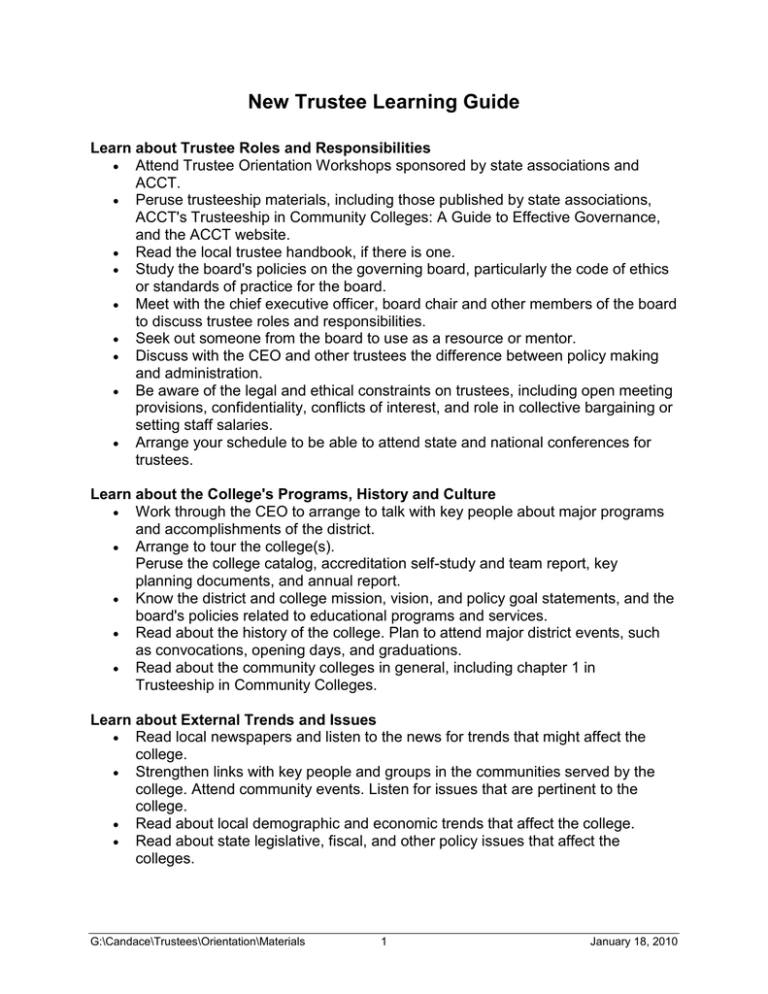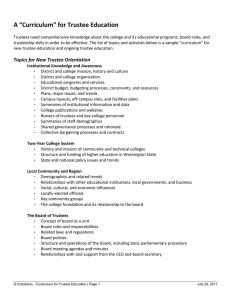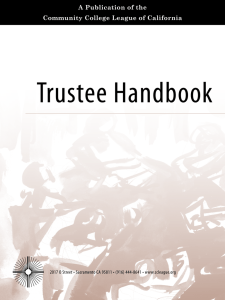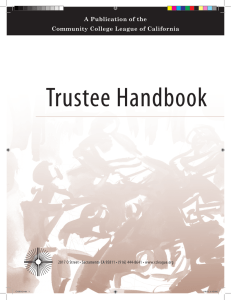New Trustee Learning Guide
advertisement

New Trustee Learning Guide Learn about Trustee Roles and Responsibilities Attend Trustee Orientation Workshops sponsored by state associations and ACCT. Peruse trusteeship materials, including those published by state associations, ACCT's Trusteeship in Community Colleges: A Guide to Effective Governance, and the ACCT website. Read the local trustee handbook, if there is one. Study the board's policies on the governing board, particularly the code of ethics or standards of practice for the board. Meet with the chief executive officer, board chair and other members of the board to discuss trustee roles and responsibilities. Seek out someone from the board to use as a resource or mentor. Discuss with the CEO and other trustees the difference between policy making and administration. Be aware of the legal and ethical constraints on trustees, including open meeting provisions, confidentiality, conflicts of interest, and role in collective bargaining or setting staff salaries. Arrange your schedule to be able to attend state and national conferences for trustees. Learn about the College's Programs, History and Culture Work through the CEO to arrange to talk with key people about major programs and accomplishments of the district. Arrange to tour the college(s). Peruse the college catalog, accreditation self-study and team report, key planning documents, and annual report. Know the district and college mission, vision, and policy goal statements, and the board's policies related to educational programs and services. Read about the history of the college. Plan to attend major district events, such as convocations, opening days, and graduations. Read about the community colleges in general, including chapter 1 in Trusteeship in Community Colleges. Learn about External Trends and Issues Read local newspapers and listen to the news for trends that might affect the college. Strengthen links with key people and groups in the communities served by the college. Attend community events. Listen for issues that are pertinent to the college. Read about local demographic and economic trends that affect the college. Read about state legislative, fiscal, and other policy issues that affect the colleges. G:\Candace\Trustees\Orientation\Materials 1 January 18, 2010 Learn about College Planning Processes and Budgets Working through the CEO, meet with appropriate people to explore the policy goals in the strategic and master plans. Meet with the appropriate personnel to review the policy aspects of the budget, its parameters and restrictions, the process for developing the budget, its relationship to strategic and master plans, and how the board monitors the fiscal health of the district. Learn about Board Meetings and Board Operations Review past agendas and minutes. Thoroughly read the agenda for each meeting. During the first few months, don't hesitate to call or meet with the CEO, mentors or other trustees, and/or the board chair before each meeting to seek clarification on agenda items. Become knowledgeable about basic parliamentary procedures and other practices related to participating in effective meetings. Be willing to observe and learn for the first few months to understand how things have been operating. Call the board chair or CEO when there are questions. Understand the key conditions of open meeting laws and laws and regulations related to conflicts of interest. Practice Good Human Relations Skills Get to know other members of the board as individuals. Learn and respect communication protocols with other trustees, the CEO, and staff members. Work to be a member of the board team. Wisely contribute ideas and opinions. Rely on the Following Resources The Chief Executive Officer. The board chair and other experienced trustees. Your state trustee association Association of Community College Trustees G:\Candace\Trustees\Orientation\Materials 2 January 18, 2010






